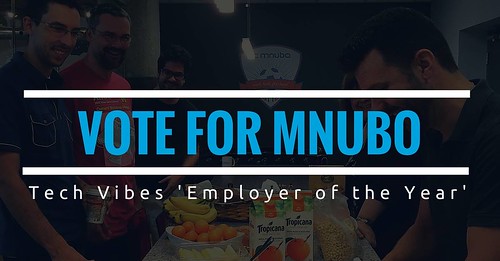Mnubo a Finalist for Employer of the Year at Canadian Startup Awards
 The Internet of Things has changed the way we experience technology and will continue to push the goal of a smart society into fruition.
The Internet of Things has changed the way we experience technology and will continue to push the goal of a smart society into fruition.
However, after 18 years working in the telecom and wireless sector, Frederic Bastien realized that the industry wasn’t prepared to handle the growing volume of sensor data generated by IoT.
In 2013 Bastien, along with colleagues JC Cimino, Aditya Pendyala and JC Beaudin went on to launch Mnubo, a company focused on analyzing the world’s IoT data to make it more valuable. This year the company is up for an Employer of the Year award.
Mnubo’s founders were originally part of the management team of Montreal startup Blueslice Networks, up until it was acquired by Tekelec in May, 2010. Though they stuck it out for another few years, “we were missing the startup life,” jokes Bastien.
Furthermore, their roles in the telecom and wireless industry had introduced them to the emergence of Machine to Machine interfacing, the precursor to the IoT. Bastien says that the group was able to observe the industry grow into what the IoT is today.
“The IoT is completely revolutionary technology that will affect all industries,” said Bastien.
He goes on to say that the multiplying amounts of data generated by IoT require us to modernize the systems that are currently designed to read data.
“The more data you have, the more complex the tools and processes you need to manage it in a scalable way,” said Bastien.
He adds that it’s not scalable for every manufacturer to build their own system for managing and storing what will be a amount of data.
“If everyone tried to read their data from scratch, it’s going to slow down the industry.”
Bastien explains that this is where Mnubo becomes an asset to companies looking to collect and learn from their object data.
He’s identified two groups of competition: Large companies developing customized solutions and other services trying to build their own real-time analytics platforms.
“Mnubo is somewhere in between. We don’t build custom solutions but we’re also not just a toolbox. We’re one of the few players with a unique approach to IoT,” Bastien says.
He says that their target market is companies that yield between $20 million and $200 million in revenue.
Bastien says that the company entered the marketplace at exactly the right time, positioning themselves at the helm of the IoT revolution.
According to Cisco, 50 billion devices will be connected to the Internet by 2020 compared to the 8.7 billion devices connected in 2012.
Techcrunch reported in October of 2015 that vulnerabilities have been discovered in IoT devices such as baby monitors, Internet-connected cars and wearables. The article goes on to say that the issue of IoT security has been pushed into the spotlight as a result of those realizations and is even being focused on by governing bodies.
Bastien acknowledges these concerns and states that maintaining the integrity of their client’s data is one of their priorities alongside delivering data-rooted insights.
Bastien believes that the IoT will be integrated into every area of human life, and hopes that it will eventually become as transparent to the public as the Internet itself has become.
“Eventually, people will stop thinking of the IoT as just hype,” says Bastien.












 Internet of Things data analytics company Mnubo announced today that it has raised a $6 million round of financing to accelerate its IoT data science development and expand the commercialization of its SmartObjects analytics service.
Internet of Things data analytics company Mnubo announced today that it has raised a $6 million round of financing to accelerate its IoT data science development and expand the commercialization of its SmartObjects analytics service.